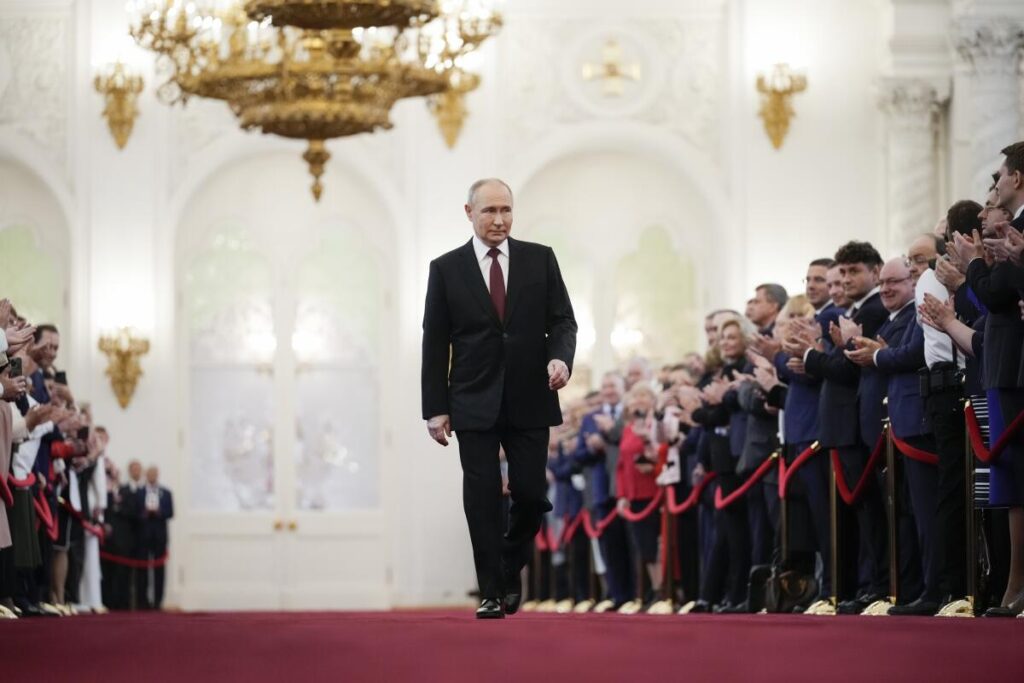
The United States and most European Union countries boycotted the inauguration ceremony at the Grand Kremlin Palace.
Vladimir Putin swore the oath of allegiance to the Russian Constitution at his inauguration for a record fifth term as president, and as he further tightened his grip on power said the country would emerge victorious and stronger from the current “difficult” period.
The ceremony on Tuesday at the Grand Kremlin Palace was boycotted by the United States, United Kingdom and several countries from the European Union amid Russia’s war in Ukraine.
“We are a united and great nation,” Putin said in his optimistic inauguration speech, to applause from an audience of about 2,500 people.
“Together we will overcome all obstacles, achieve everything we have planned and together we will win,” was his message to the Russian people as he launched another six-year term.
The 71-year-old won the March election by clinching 87.28 percent of the vote in a poll that analysts said lacked democratic legitimacy after several candidates opposed to the war in Ukraine were barred from contesting by the electoral commission.
It came weeks after the death of his rival, Alexey Navalny, in an Arctic penal colony. Other leading critics have been either jailed or forced to flee abroad.
‘Liar, thief, murderer’
Navalny’s widow, Yulia Navalnaya, on Tuesday urged supporters to keep up the fight against Putin, who she described as “a liar, a thief and a murderer”.
US Department of State spokesperson Matthew Miller told reporters, “We certainly did not consider that election free and fair but he is the president of Russia and he is going to continue in that capacity.”
The ceremony took place a day after Russia announced plans for a tactical nuclear weapons drill, blaming what it said were “provocative” moves by Western countries over Ukraine, which Russia invaded more than two years ago.
Ukraine said it saw no legal grounds for recognising him as the “democratically elected and legitimate president of the Russian Federation”.
Ukraine’s Ministry of Foreign Affairs said the swearing-in ceremony sought to create “the illusion of legality for the nearly lifelong stay in power of a person who has turned the Russian Federation into an aggressor state and the ruling regime into a dictatorship”.
Putin thanked soldiers taking part in the war and called them “heroes” fighting for “the motherland”.
“We are looking forward confidently,” he said in his speech, which was aired on national television.
“I assure you that the interests and security of the people of Russia will continue to be above all for me,” he said.
While the Russian leader said he was not ruling out dialogue with Western countries, he insisted it must be carried out on equal terms, “respecting the interests of each other”.
“The choice is theirs: do they intend to continue trying to contain Russia, continue the policy of aggression, continuous pressure on our country for years, or look for a path to cooperation and peace.”
Russian and Ukrainian troops have been heavily hit in the war, with large numbers of casualties on both sides. But Russian forces have been gaining ground in Ukraine, which is struggling with shortages of soldiers and weaponry.
Putin has been in power as president or prime minister since 1999. Critics say his legacy over the past nearly 25 years has been one of war, slow economic growth and repression.
At the start of a new term, the Russian government is routinely dissolved so that Putin can name a new prime minister and cabinet.


